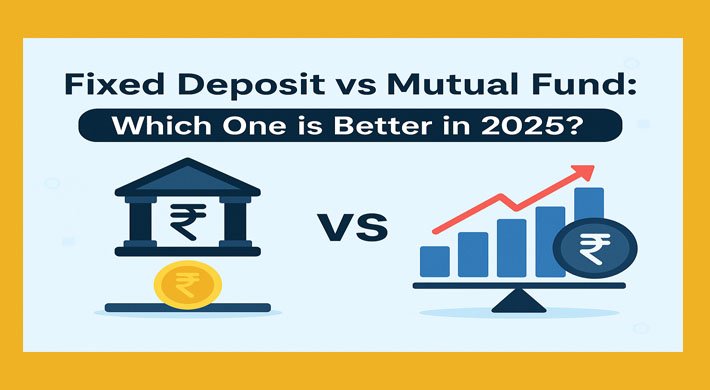Fixed Deposit vs Mutual Fund: Which One is Better in 2025?
Grisha July 10, 2025 No Comments

Still confused between FDs and Mutual Funds? Here’s a smart comparison in 2025 to help you grow your money with confidence!
What is a Fixed Deposit (FD)?
A Fixed Deposit (FD) is a traditional investment option offered by banks and NBFCs. You invest a lump sum for a fixed period at a fixed interest rate.
✅ Key Features:
-
Guaranteed returns
-
Low risk
-
Lock-in period (7 days to 10 years)
-
TDS applicable if interest exceeds ₹40,000/year (₹50,000 for senior citizens)
What is a Mutual Fund?
Mutual Funds pool money from investors and invest in stocks, bonds, or other assets managed by professional fund managers.
✅ Key Features:
-
Market-linked returns
-
Potential for higher growth
-
Options: Equity, Debt, Hybrid, ELSS
-
Tax-efficient with long-term benefits
FD vs Mutual Fund: Head-to-Head Comparison (2025)
| Feature | Fixed Deposit (FD) | Mutual Fund |
|---|---|---|
| Returns | 5% – 7.5% (fixed) | 10% – 15% (equity, variable) |
| Risk | Very Low | Moderate to High |
| Liquidity | Low (premature penalty) | High (especially open-ended) |
| Tax Benefits | 80C (Tax-saving FD only) | 80C for ELSS schemes |
| Ideal For | Risk-averse investors | Growth-focused investors |
| Compounding | Simple | Compound (more powerful) |
Example: ₹1 Lakh Investment Over 5 Years
| Investment Type | Expected Value (Approx) |
|---|---|
| Fixed Deposit @ 6.5% p.a. | ₹1.38 Lakh |
| Mutual Fund @ 12% CAGR | ₹1.76 Lakh |
📌 Mutual funds offer higher returns but involve market risks. FDs offer predictability.
Who Should Choose What?
Choose FD If:
-
You want capital protection
-
Need guaranteed, fixed returns
-
Prefer a short-to-medium term horizon
-
You’re a senior citizen (higher FD rates)
Choose Mutual Funds If:
-
You want to beat inflation
-
Aim for long-term wealth creation
-
Comfortable with market fluctuations
-
You’re investing for 5+ years
What About Risk in Mutual Funds?
Yes, mutual funds carry risk—but it’s manageable with:
-
SIPs (Systematic Investment Plans)
-
Diversified funds
-
Long holding periods
-
Proper asset allocation
Tax Comparison (2025 Update)
Fixed Deposit:
-
Interest is taxed as income
-
TDS applies beyond ₹40,000
Mutual Fund:
-
Equity MF: LTCG tax @10% (after ₹1 lakh)
-
Debt MF (post-2023): Taxed as per slab
📌 Mutual funds may be more tax-efficient, especially over long durations.
Expert Tip for 2025
💡 Combine both!
-
Use FD for emergency & stable returns
-
Use Mutual Funds for long-term growth
This mix provides liquidity, safety, and growth in a balanced portfolio.
Final Verdict: Which is Better?
| Purpose | Best Option |
|---|---|
| Safety & Stability | Fixed Deposit |
| Wealth Creation | Mutual Fund (Equity) |
| Tax Saving | ELSS Mutual Fund |
| Short-Term Parking | FD or Liquid MF |
✅ FDs are best for safety.
✅ Mutual Funds are best for beating inflation and long-term gains.
FAQs: Fixed Deposit vs Mutual Fund
Q1: Can I lose money in mutual funds?
Yes, but the risk reduces with diversification and time. Long-term investments usually outperform FDs.
Q2: Are FDs better than SIPs?
FDs are safer. SIPs have growth potential. SIPs in equity mutual funds outperform FDs over 5+ years.
Q3: Which gives better returns in 2025?
Mutual funds offer better returns, especially equity funds, though not guaranteed.
Q4: Is ELSS better than Tax-saving FD?
Yes. ELSS offers higher returns with just 3-year lock-in vs 5-year FD.
Bonus: Where to Start?
Start SIPs or invest in FDs through:
-
Zerodha Coin, Groww, Kuvera (Mutual Funds)
-
Banks (ICICI, SBI, HDFC for FDs)
-
Online aggregators like Paytm Money, ET Money
Promote Your Finance Brand on VyaparGrow
Are you a financial planner, app, or advisory firm?
Promote your services on VyaparGrow.com—a free classified platform for Indian businesses & startups.
🎯 Reach 1000s of Indian users actively seeking financial help.
Leave a Comment
Your email address will not be published. Required fields are marked. *